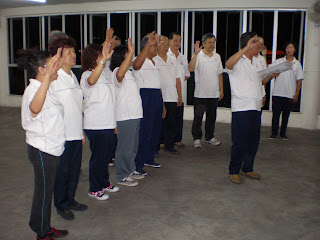It is very rare to see a Malay learning Taichi Chuan in this country. Recently one Malay student joined our Taichi Chuan class. We are all very excited over this affair. Dr Law HN of the NS Shenlong Association interviewed Dato’ Rastam as follows:
Law: Dato’ could you introduce yourself please.
Rastam: Thank you. Now I am fully retired. When I was young, I was a Civil Servant. Among the posts I held were the Deputy Secretary of the Ministry of Defence (1969 – 1971), the Deputy Governor of Bank Negara (1971~73) and the Managing Director of Petronas (1973-1989). .
Law: How do you know about this Taichi Chuan group?
Rastam: I have had a life-long interest in meditational exercises. I have read many books on Yoga, Taichi Chuan, Qigong, etc.
I shifted from Kuala Lumpur to Bandar Springhill, Lukut seven years ago. Now that I am retired and have a lot of leisure time available I thought this was the right time for me to pursue the next stage of my development and learn the practical side of Tai Chi.
I have been asking almost every person I meet whether there is a Tai Chi class in Port Dickson, Lukut, or Seremban but most people are not aware of any. However, about two months ago, a good friend brought me to this place. And so , here I am, happily struggling to learn Tai Chi with my old bones…
Law: What do you expect to get from learning Taichi Chuan?
Rastam: To begin with, as we get older, most people expect to get weaker and to have more health problems. I expect the practice of Tai Chi to reduce these problems for me.
That is on the physical side. On the mental side, I expect Tai Chi to give me peace and tranquility. This mental aspect is even more important to me than the physical aspect.
Law: What do you think is the biggest difficulty in learning Taichi Chuan?
Rastam: To have the patience, the persistence and the perseverance to practice daily, without fail.
Law: What do you like best in Taichi Chuan?
Rastam: The breathing aspect of Tai Chi practice. I had earlier in my reading discovered the importance Yoga attaches to controlled breathing in its practice of Pranayama. Many books have been written on this subject but I find it difficult to narrow down the choices I need to make. But Tai Chi seems to have narrowed them down for me. I am very comfortable with Taichi Chuan’s stress on slow and meditated breathing. For example, in Bear Swing and Quashing the Demon we do a lot of meditated breathing. It’s exactly what I have been looking for.
Law: What is your opinion on Taichi Chuan?
Rastam: I feel that since Taichi Chuan has been passed down by the Chinese people for thousands of years, from generation to generation, there must be some value to it. Otherwise it wouldn’t have survived such a long transmission.
Law: Why do you like Taichi Chuan as practiced here?
Rastam: I feel that Taichi Chuan is run like a club here. Everybody is trying to be healthy himself and is trying to encourage the whole community to be healthy. They say health is better than wealth. So if you can contribute good health to your community you are making a really worth while contribution.
Law: Do you think we can promote Taichi Chuan to the Malay folks?
Rastam: Definitely. Islam attaches a great deal of importance to mental peace. All over the world, when one Muslim meets another, he says: “Peace be on you”. The Prophet teaches his followers the importance of mental peace. He also instructs them to seek knowledge even from far away China. Tai Chi seems ideal for both purposes.
Conclusion:
From Dato’s Rastam’s interview, we come to the realization of a need to adopt a positive attitude when it comes to sharing the benefits of Taichi Chuan with the Malay community. Like tennis and golf Tai Chi is not a religion. It is there for one to take advantage of and to enjoy. If we can contribute to the health of the whole community we certainly should not refrain from doing so.
Many thanks to Dato’Rastam from NS Shenlong Association.
 Chinse website: sbntaiji.blogspot.com
Chinse website: sbntaiji.blogspot.com


